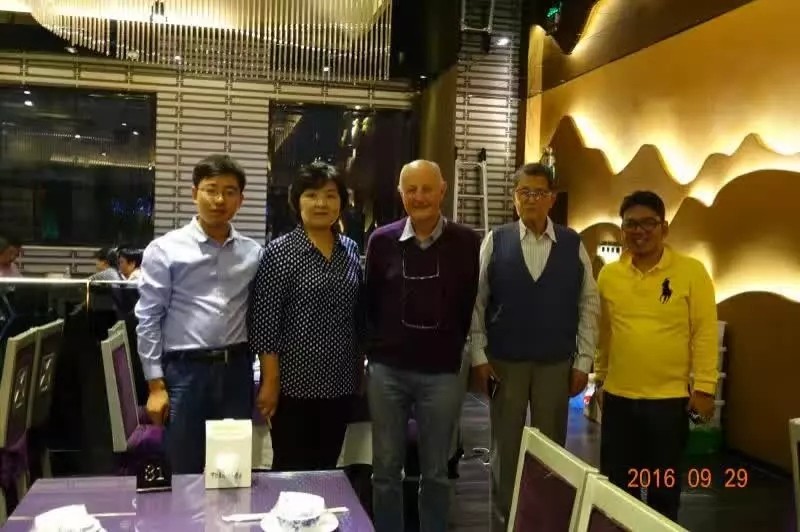博文
安全学者Andrew Hale撰文记录访问中国后的感想
||
China Calling [2016年10月13日]
近期在hastam发现了安全学者Andrew Hale撰文记录访问中国后的感想,分享于此。
2016年受托邀请了国际知名的安全科学学者,Safety Science的第一任主编Hale Andrew来西安参加安全行为与管理国际会议,并在西安科技大学、首都经济贸易大学以及中国矿业大学分别与国内的高校进行了交流。在访问北京期间,专门安排了Hale Andrew与我国安全科学的开创者、《中国安全科学学报》的首任主编刘潜先生、我的导师郭晓宏教授见面进行了座谈,当时的情景历历在目。一是Hale对我博士论文的指导,二是我们即使合作发表了2篇论文之后都没有见过面。就在博士毕业的2-3月,有幸与合作者有一次面对面的机会。
从做到左依次为李杰、我的导师郭晓宏教授、Hale Andrew,刘潜先生,Zaki
Andrew Hale在回到英国之后,专门撰文记录了这次中国之行。
Andrew Hale中国行的记录: 有对我国安全教育规模之大的吃惊,也有对我国的全新认识,也感受到了我们的热情以及学术的开放性。
Professor Andrew Hale writes about this recent trip to China to give a keynote speech at an international conference.
I just got back from a 10 day trip to China, a first for me. I was there to give a keynote speech to two combined international conferences, about behavioural safety and the theory and practice of safety management. I chose to present the results of a literature review that IOSH funded a few years ago on the management of rules and procedures, because I wanted to hear how the centralised regime in China tackles such things. While I was in China it was arranged for me to give a couple of hours talk on three occasions to the staff and students of three different university Safety Science or Safety Engineering groups, those in Xi’an and Beijing. So I got their views too. But I also got useful information to sketch in a background to those views.
The first thing that hit me on talking to the academics was just how vast China is in both area and population. I learned that there are 167 universities which run courses in safety and health at Bachelors and/or Masters levels and have PhD students doing research. I was quoted an average figure of 200 students studying the subject at one or other of those levels at any one time in each of those universities. If we multiply that up, it gives a number of graduates ranging between 8000-10,000 coming onto the market each year, depending on the balance between those different courses! That would make any professional organisation’s mouth water. It is also a potentially loud voice in debating the issues of the role, and competence of those safety professionals. We should be making work of it to get that voice better hitched up to the international fora of scientific conferences and professional certification bodies.
I would love to have known what jobs all the graduates go to and in what numbers, but the universities I went to didn’t seem to have those figures; nor did they seem to have systematic ways of staying in touch with the alumni so as to use their input in improving the courses. The universities did however recognise that they have a big problem in coping with a very variable quality of courses and course material across all those universities, so if anybody out there would like a job there is a huge market for good quality teaching material. Ideas are being developed in some groups to use existing MOOCs (Massive Open Online Courses) and to try and get new ones set up. They recognise that that would probably happen globally only in English unless they can put together home grown Mandarin versions. While a lot of students and staff can manage to understand written and spoken English, the quality of their own written and spoken English is a matter of concern to them. (Easy for me to say, who only has two words of Mandarin – Hello and Thank you)
Back to the rules and procedures. As I had expected there was huge, but rather resigned, concern about the massive pile of detailed regulations issued by central government, but also by provinces and municipalities, literally well over a metre high pile for any organisation or site, which no company could possibly work its way through in its entirety and which contains significant numbers of conflicting provisions and ambiguities; things my conference talk had highlighted as being clear in our literature review. Goal-based regulations hardly exist, so almost all regulations are written in a detailed, ‘do-it-this-way’, format. It makes the complaints about regulations in the UK pale into insignificance. I didn’t hear much in the way of plans or ideas about how to change that situation, hence the resignation. I suspect that that plethora of detail finds its reflection in the style and content of the course material for the students, lots of rote learning and little space for innovation or principled discussion and adaptation. However, it is good that these sorts of problem are frankly and openly discussed, something I did wonder about before my trip.
What was the most lasting impression of my visit, however, was the friendliness and enthusiasm with which I was met, the openness of debate, the desire to learn from experience outside China and the attentiveness with which I was looked after from arrival to departure. That helped to drive away the expectation I went with, of grey communism and closed hierarchies.
Oh, and if you do visit, be sure, while you are there, to keep the time free to visit the Terracotta Warriors in Xi’an, the Great Wall and the Forbidden City in Beijing. They are all mind-blowing. But do resign yourself to long traffic jams and some hair-raising driving – rules in traffic anyone? The most common one which was followed seemed to be “if in doubt, blow your horn”.
Further reading on Safety rules is available here and here for the IOSH website info on the safety rules research.
文字来源:https://www.hastam.co.uk/china-calling/
https://blog.sciencenet.cn/blog-554179-1102153.html
上一篇:Andrew Hale中国行讲座之一[2016-10-22]
下一篇:CiteSpace 5.2.R2的相关问题
